

Water use for food production. Food prices. Novel access to nitrogen. Sources of biofuel. Pacific island trials closed-loop aquaponics. Rarotonga, the largest of the Cook Islands, is combining aquaculture with hydroponics in a pilot project funded by the New Zealand Aid Programme.
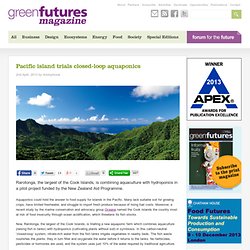
Aquaponics could hold the answer to food supply for islands in the Pacific. Many lack suitable soil for growing crops, have limited freshwater, and struggle to import fresh produce because of rising fuel costs. Monsanto Declares Defeat In European Market. Despite the recent bumper crop of GMO labeling legislation in the U.S., Monsanto still has a strong grip on the country--just look at the so-called Monsanto Protection Act, which lets farmers plant GMO crops before the Department of Agriculture has declared them safe.
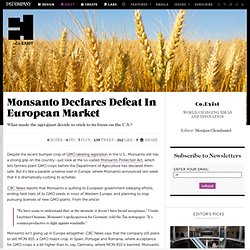
But it’s like a parallel universe over in Europe, where Monsanto announced last week that it is dramatically curbing its activities. CBC News reports that Monsanto is quitting its European government lobbying efforts, ending field trials of its GMO seeds in most of Western Europe, and planning to stop pursuing licenses of new GMO plants. Glyphosate Found in Human Urine Across Europe. People in 18 countries across Europe have been found to have traces of the weed killer glyphosate in their urine, show the results of tests commissioned by Friends of the Earth Europe and released today.
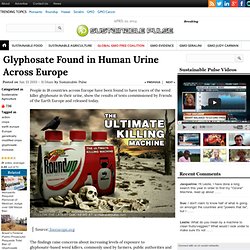
Source: foeeurope.org The findings raise concerns about increasing levels of exposure to glyphosate-based weed killers, commonly used by farmers, public authorities and gardeners across Europe. The use of glyphosate is predicted to rise further if more genetically modified (GM) crops are grown in Europe [2]. Find Full Results Here. Bee faithful? Plant-pollinator Relationships Compromised when Bees Decline - Crop Articles from The Crop Site - The Crop Site. Featured Articles Bee Faithful?
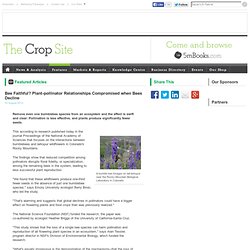
Plant-pollinator Relationships Compromised when Bees Decline 03 August 2013. A Long-Sought Goal: Crystallizing an Elusive Protein / March 22, 2013 / News from the USDA Agricultural Research Service. By Dennis O'BrienMarch 22, 2013 A U.S.
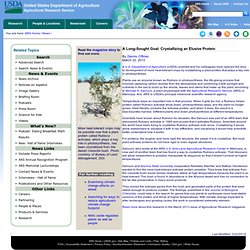
Department of Agriculture (USDA) scientist and his colleagues have opened the door to development of more heat-tolerant crops by crystallizing a plant protein that plays a key role in photosynthesis. Plants use an enzyme known as Rubisco in photosynthesis, the life-giving process that involves capturing carbon dioxide from the atmosphere and combining it with sunlight and nutrients in the soil to build up the shoots, leaves and stems that make up the plant, according to Michael E. French farmer developed industrial snail-slime harvesting process to feed cosmetic industry’s appetite for goo.
By ReutersFriday, July 19, 2013 20:16 EDT.
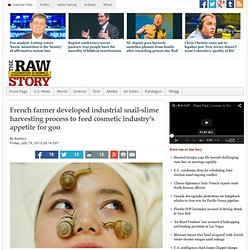
Livestock falling ill in fracking regions, raising concerns about food - News. While scientists have yet to isolate cause and effect, many suspect chemicals used in drilling and hydrofracking (or “fracking”) operations are poisoning animals through the air, water, or soil.
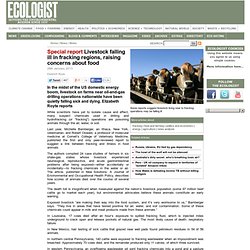
Last year, Michelle Bamberger, an Ithaca, New York, veterinarian, and Robert Oswald, a professor of molecular medicine at Cornell’s College of Veterinary Medicine, published the first and only peer-reviewed report to suggest a link between fracking and illness in food animals. The authors compiled 24 case studies of farmers in six shale-gas states whose livestock experienced neurological, reproductive, and acute gastrointestinal problems after being exposed—either accidentally or incidentally—to fracking chemicals in the water or air. The article, published in New Solutions: A Journal of Environmental and Occupational Health Policy, describes how scores of animals died over the course of several years.
Cows lose weight, die Nor does anyone else. Monsanto hires infamous mercenary firm Blackwater to track activists around the world. High immunity cows soon available. Sires with a higher natural level of disease resistance will soon be available for farmers to buy, thanks to the latest technology.
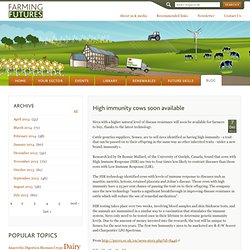
Cattle genetics suppliers, Semex, are to sell sires identified as having high immunity - a trait that can be passed on to their offspring in the same way as other inherited traits - under a new brand, immunity+. Wasps v moths: Biocontrol uses nature against crop pests. 21 January 2013Last updated at 21:51 ET By Katia Moskvitch Technology reporter, BBC News.
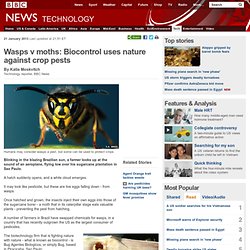
Anatomy gave some grasses the upper hand. BROWN (US) — Anatomy explains why some grasses evolved a more efficient means of photosynthesis than others, scientists report.
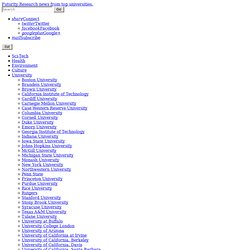
Biologists refer to the grasses that have evolved this better means of making their food in warm, sunny, and dry conditions with the designation “C4.” Grasses without that trait are labeled “C3.” What scientists had already known is that while all of the grasses in the BEP and PACMAD broad group, or clade, have the basic metabolic infrastructure to become C4 grasses, the species that have actually done so are entirely in the PACMAD clade.
An international team of scientists wondered why that disparity exists. RTLS: The technology tracking cows to make them happy. When Asger Christensen started farming there were 40,000 dairy farmers in Denmark. Now there are only 3000. Livestock falling ill in fracking regions, raising concerns about food. While scientists have yet to isolate cause and effect, many suspect chemicals used in drilling and hydrofracking (or "fracking") operations are poisoning animals through the air, water, or soil. Last year, Michelle Bamberger, an Ithaca, New York, veterinarian, and Robert Oswald, a professor of molecular medicine at Cornell's College of Veterinary Medicine, published the first and only peer-reviewed report to suggest a link between fracking and illness in food animals.
The authors compiled 24 case studies of farmers in six shale-gas states whose livestock experienced neurological, reproductive, and acute gastrointestinal problems after being exposed—either accidentally or incidentally—to fracking chemicals in the water or air. The article, published in New Solutions: A Journal of Environmental and Occupational Health Policy, describes how scores of animals died over the course of several years. 275na3.pdf (application/pdf Object) Livestock livelihoods for the poor: Beyond milk, meat and eggs. Kenya farm boy drinking milk (photo credit: ILRI/Dave Elsworth). The science journal Animal Frontiers this month (Jan 2013) focuses on the links between livestock production and food security. Maggie Gill edited the issue. Gill is an animal nutritionist by training who has spent years as a senior member of research institutions in the the UK (Natural Resources Institute, Natural Resources International, Macaulay Land Use Research Institute, Scottish Government) and presently divides her time between work for the UK Department for International Development and the University of Aberdeen while also serving on the CGIAR’s Independent Science and Partnership Council.
She is a former board member of the International Livestock Research Institute (ILRI). 2020 vision: tackling future arable challenges - 12/29. Arable growers will face significant technical challenges by 2020 - as loss of chemistry and resistance, as well as climate change, will add to the pressure to produce sustainable crops. GCARD 2012. From Forward Thinking to Forward Acting. Pesticide application as potential source of noroviruses in fresh food supply chains. Letters: Learning lessons from the ashes. The UK boasts several internationally significant populations of ash that require the highest levels of protection. New foot-and-mouth vaccine. Scientists have developed a new methodology to produce a vaccine for foot-and-mouth disease virus (FMDV). Big, Smart and Green: A Revolutionary Vision for Modern Farming. Plant oils may provide a pathway to health and sustainability.
In a new article, published in this month’s Plant Biotechnology Journal, scientists at Rothamsted Research describe their innovative research to unlock plant lipid pathways, to produce oils with greater nutritional potential as well as helping to address issues of fish stock sustainability. Ash dieback: This shambles fills me with fear for my beloved countryside. News that a fatal disease has landed on British soil understandably causes alarm. Africa: Locust Warning for Northwest Africa. Dakar — Swarms of desert locusts are likely to migrate to Algeria, Libya, Mauritania and Morocco in the coming weeks from West Africa and the Sahel region, says the UN Food and Agriculture Organization (FAO), which urges the four countries to prepare for pest control. Ash dieback unstoppable, but fungicides could save most valuable. Study Suggests Plants Can Be Altruistic Too.
Soil resources. Aricultures impact on biodiversity. Plant breeding.